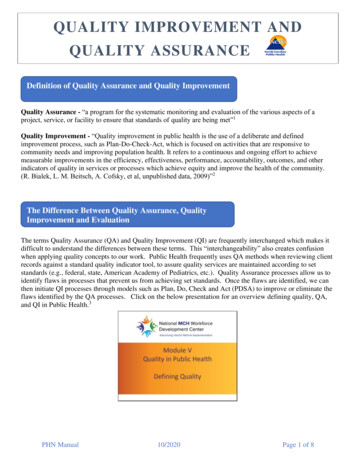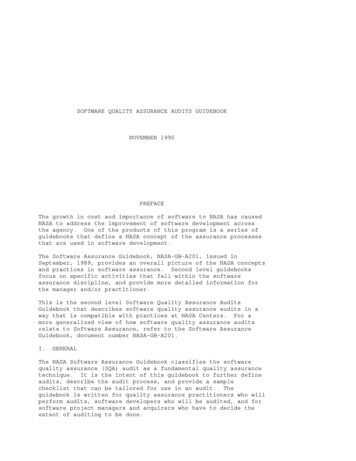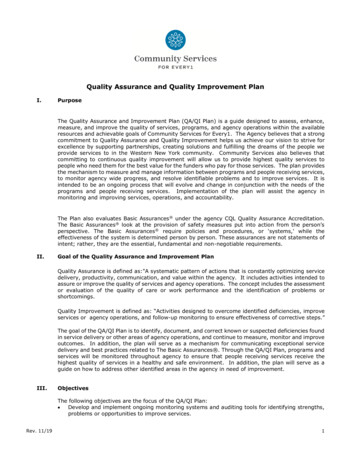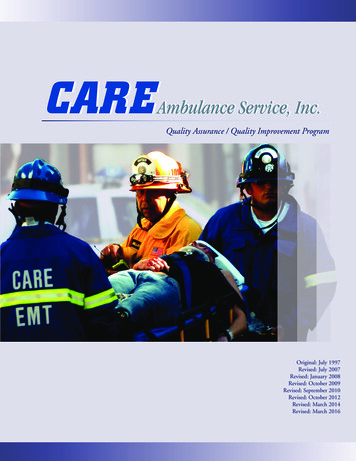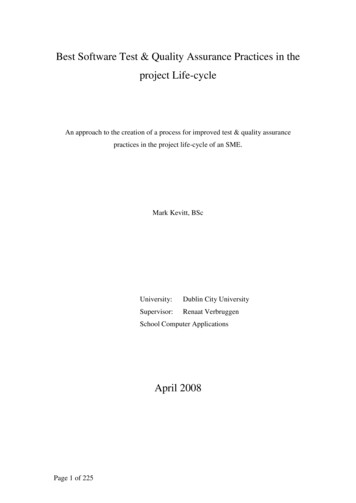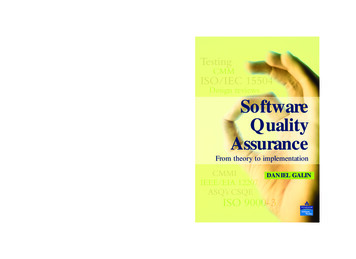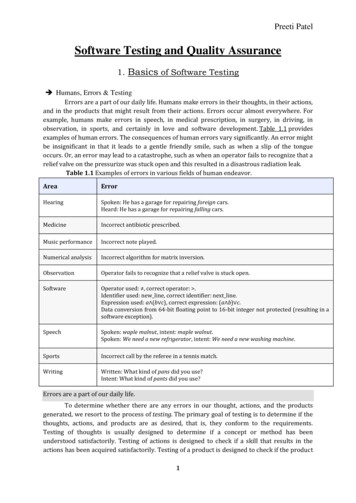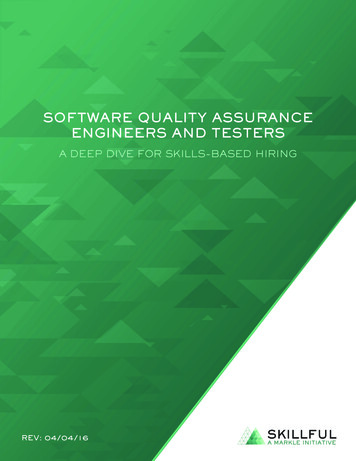
Transcription
SOFTWARE QUALITY ASSURANCEENGINEERS AND TESTERSREV: 04/04/16
Occupation Overview: Software QA Engineers & TestersFoundational CompetenciesOccupation-Specific Competencies Critical Thinking: Using logic and reasoning to identify the strengthsand weaknesses of alternative solutions, conclusions, or approaches toproblems. Reading Comprehension: Understanding written sentences andparagraphs in work-related documents. Active Listening: Giving full attention to what other people aresaying, taking time to understand the points being made, askingquestions as appropriate, and not interrupting at inappropriate times. Speaking: Talking to others to convey information effectively. Writing: Communicating effectively in writing as appropriate for theneeds of the audience. Programming: Writing computer programs for various purposes. Monitoring: Monitoring/assessing performance of yourself, otherindividuals, or organizations to make improvements or take correctiveaction. Complex Problem Solving: Identifying complex problems andreviewing related information to develop and evaluate options andimplement solutions. Quality Control Analysis: Conducting tests and inspections ofproducts, services, or processes to evaluate quality or performance. Systems Evaluation: Identifying measures or indicators of systemperformance and the actions needed to improve or correctperformance relative to the goals of the system. Basic General Database: Demonstrated proficiency with SQL basics (e.g., selecting,inserting, updating, deleting records), at least one database management softwareapplication, and database fundamentals such as normalization, schemas, andrelationships. Basic Software Quality Assurance: Demonstrated ability to design individual tests,create test scripts, and conduct tests and inspections of software to evaluate performanceagainst requirements, quality, and performance. Includes the use of test tools such asLoadRunner and JMeter. Basic Software Development: Familiarity with the use of object oriented techniques,user experience and responsive design, web mobility, back-end processes,communication tools (such as AJAX), web services (including REST), a web framework,version control, and a development lifecycle methodology (such as Agile). . Basic Core Coding Languages: Familiarity with the concepts and ability to developvery basic front-end, back-end and / or mobile applications utilizing core codinglanguages (e.g., Java, C#, Objective C, JavaScript) on a development platform andintegrating data storage (including SQL), libraries, methods, interfaces, and/or objects. Basic Systems Design and Implementation: Demonstrated ability to assist customersin the gathering of requirements and design, implement, and support simple technologysolutions to existing business problems. Basic Web Development Languages: Basic familiarity with such commonly-used webdevelopment languages as AJAX, XML, HTML 5, and JavaScript. Intermediate Scripting: Demonstrated proficiency developing and using simple scriptsthat utilize common scripting languages such as PERL, Python, or shell scripts. Basic Tech Support: Familiarity with the use of some components of commonly-usedcomputer hardware, software, applications, etc. and a basic ability to diagnose customerproblems and provide troubleshooting and issue resolution support. Intermediate Testing: Demonstrated ability to design tests, create test scripts, ensurethat test cases mimic user usage, and execute and validate unit, system, and performancetest routines for a team; Demonstrated ability to use appropriate test tools. Intermediate General Information Security: Demonstrated ability to install, configure,troubleshoot, test, and maintain in a secure manner the portion of the IT environmentunder their responsibility (networks, communication, hardware, software, and otherdevices) to ensure their confidentiality, integrity, and availability.Job Description (Example)Activities (Example List)Develop and execute software test plans in order to identify softwareproblems and their causes. Work in a cutting edge agile software development environment as aSoftware Test Engineer ensuring the quality of the architecture of ourEnterprise software applications. Write automated tests at the services/integration and UI layers, usingsoftware automation tools. Leverage agile testing framework, design and codefunctional/integration test cases and scenarios pertaining to variouscomponents of the application that ensures the software meets theintended requirements that meets all established quality standardsspecified in test plan. Execute test cases and scripts; perform data validation; implement andmaintain regression test cases. Assist developers with debugging defects/Prod tickets by reproducingthem in the test environment; log and track problems (bugs). Work closely with product owners to understand product specifics andto create corresponding test plan, quality standards, and strategies forthe project; participate in the constant improvement of our testautomation and continuous integration practices. Design test plans, scenarios, scripts, or procedures. Test system modifications to prepare for implementation. Develop testing programs that address areas such as database impacts,software scenarios, regression testing, negative testing, error or bugretests, or usability. Document software defects, using a bug tracking system, and reportdefects to software developers. Identify, analyze, and document problems with program function,output, online screen, or content. Monitor bug resolution efforts and track successes. Create or maintain databases of known test defects. Plan test schedules or strategies in accordance with project scope ordelivery dates. Participate in product design reviews to provide input on functionalrequirements, product designs, schedules, or potential problems. Review software documentation to ensure technical accuracy,compliance, or completeness, or to mitigate risks.
Prioritized Foundational Competencies: Software QA Engineers & TestersMost Common Required Competencies1Quality Control Analysis: Understanding how to identify and testsystem boundaries, then conducting tests and inspections to evaluatequality or performance; leveraging basic concepts of coding to findareas of weakness (unintended values, system architecture, processflow); ability to focus on both micro and macro components of aproducts success.2Critical Thinking: Using logic and reasoning to first identify therequirements and purpose of a program to determine potentialweaknesses; capturing and prioritizing the impact of identified bugs;taking on viewpoint of multiple possible users.3Communication: Applying reading, writing, and speaking skills togather detailed system requirements for testing, thoroughly andaccurately recording results, and presenting back to appropriateparties.Most Common Break Point CompetenciesQuality Control Analysis: See previous.12Critical Thinking: See previous.3Most Preferred Competencies1Systems Evaluation: Identifying measures or indicators of systemperformance and the impact of a change within the system, relative tothe goals of the system; differentiating between perceived and actualperformance value; familiarity with individual components and theirconnection to overall system.Most Hard-to-Find Competencies1Active Listening: See previous.2233Most Evolving Competencies23Programming: Understanding the basics of computer programming(e.g., system structure, end-end data flow, application processes) toplan and act on testing procedures; ability to mimic the mindset of adeveloper during testing.Critical Thinking: See previous.Critical Thinking: See previous.1Active Listening: Taking time to understand the points being made,asking questions and clarifying details as appropriate; incorporatingdetails from interactions into testing plans and reports; drawingappropriate conclusions using previous experiences and knowledge.Programming: Evolution driven by rapid change in the landscape oftechnology and its application to all aspects of business; changesmake it important to be aware of how new architecture, processes,and tools are integrated into applications to inform new ways oftesting.Critical Thinking: Evolution driven by expanding number ofpossible end-users as more software packages are created withcustomization in mind; changes make it important to capture themultitude of ways software may be used in testing and bugidentification.Complex Problem Solving: Evolution driven by software becomingprogressively more multi-faceted, with greater interconnectivity bothinternally and externally; changes make it important to expand howyou design and implement QA testing (applying more efficient testingtools, expanded user pathway testing, increased reliance on multipledata connections).Complex Problem Solving: Identifying unique issues and reviewingrelated information or patterns to categorize into larger system bugs;chasing issues back to origins and thoroughly recording possiblecauses; understanding interaction of smaller components in overallsystem.
Prioritized Occupation-Specific Competencies: Software QA Engineers & TestersMost Common Required Competencies1Intermediate Testing: Proficiency with how to design tests, createtest scripts, ensure that test cases mimic user usage, execute andvalidate unit tests, and use appropriate test tools for their ownchanges. Proficiency with system and performance testing.Most Common Break Point CompetenciesIntermediate Testing: See previous.1Intermediate Scripting: Demonstrated ability with the use ofcommon scripting languages such as PERL, Python, or shell scripts.23Intermediate Scripting: See previous.2Basic Tech Support: Familiarity with the use of some componentsof commonly-used computer hardware, software, applications, etc.and a basic ability to diagnose problems and provide troubleshootingand issue documentation; ability to independently operatetechnological tools.Basic Tech Support: See previous.3Most Preferred CompetenciesMost Hard-to-Find CompetenciesIntermediate Testing: See previous.11Intermediate Scripting: See previous.2323Intermediate Testing: See previous.2Basic General Database: Demonstrated proficiency with SQLbasics (e.g., selecting, inserting, updating, deleting records), at leastone database management software application, and databasefundamentals such as normalization, schemas, and relationships.Most Evolving Competencies1Basic Core Coding Languages: Familiarity with developing simplefront-end, back-end and/or mobile applications utilizing core codinglanguages (e.g., Java, C#, Objective C, JavaScript) on a developmentplatform; integrating data storage (including SQL), libraries, methods,interfaces, and objects; and using code analysis and debuggingtechniques.Basic Testing: Evolution driven by occurrence of new applicationarchitectures and design methodologies; changes make it important totrain with and apply latest testing tools while remaining informed ontrends and focus of industry through participation in educationalchannels (industry associations, publications, continuing education).Intermediate General Information Security: Evolution driven byinformation security becoming a key business focus as more complexsystems bring greater vulnerability to sensitive data; changes make itimportant to keep credentials and methodologies up-to-date toprotect from constantly evolving threats.Basic Systems Design and Implementation: Evolution driven bycustomized software components being developed for everycustomer; changes make it important to best align technical solutionswith business needs, QA feedback should help drive developerstowards this end with actionable responses connecting currentversion of product with desired end-state.Basic General Database: See previous.3
Occupation Deep Dive: Software QA Engineers & TestersJob Titles Within This Occupation Quality Assurance Engineer Quality Assurance Analyst Quality Assurance Tester Software Test Engineer Software Tester Quality Assurance Specialist Software Quality Assurance Engineer Product Assurance Engineer Quality Assurance Director Software Quality Engineer Automation Engineer Web QA Engineer Mobile QA EngineerCertification and Education Preferences (Example) Certified Software Quality Analyst (CSQA) Certified Software Test Engineer (CSTE) ISTQB Certified Tester, Foundation Level (CTFL) Quality Improvement Associate Certification (CQIA) Certified Software Test Professional (CSTP)Tools Used (Example List) SQL JAVA LINUX/UNIX Oracle Scrum Python Agile Development Lode Runner HP Quality CenterOther Relevant Foundation Competencies Selenium Browser Technology SOA Jira Team Foundation Server (TFS) GitHubOther Relevant Occupation-Specific Competencies1Critical Thinking1General Database2Reading Comprehension2Software Quality Assurance3Active Listening3Software Development4Speaking4Core Coding Languages5Writing5LINUX/UNIX6Programming6Systems Design and Implementation7Monitoring7Basic Web Development Languages8Complex Problem Solving8Scripting9Quality Control Analysis9Microsoft Stack10 Systems Evaluation10 Tech Support11 Active Learning11 Microsoft Office12 Systems Analysis12 Business Process and Analysis13 Science13 Project Management14 Judgment and Decision Making14 Validation15 Operations Analysis15 Core Operating Systems16 Coordination16 General Data Techniques17 Time Management17 IT/Hardware18 Troubleshooting18 UI/UX Design19 Social Perceptiveness19 General Networking Tools and Concepts20 Technology Design20 Business Solutions21 Learning Strategies21 Back-end Web Tools and Framework22 Operation Monitoring22 Network Protocols23 Instructing23 Database Administration24 Persuasion24 Graphic Design25 Installation25 Web Development Concepts
2 Software Quality Assurance 3 Software Development 4 Core Coding Languages 5 LINUX/UNIX 6 Systems Design and Implementation 7 Basic Web Development Languages 8 Scripting 9 Microsoft Stack 10 Tech Support 11 Microsoft Office 12 Business Process and Analysis 13 Project Management 14 Validati
